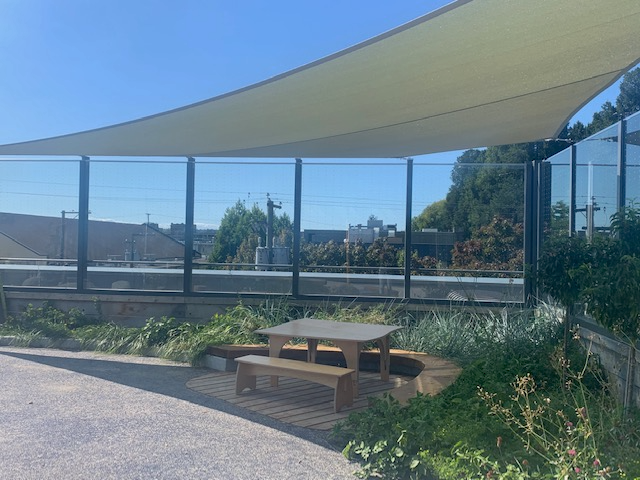Use this image as both the current Page Image and for News listings
In 2021 BC Cancer Prevention and researchers from BC Cancer Research Institute partnered with the City of Vancouver and Kitsilano Neighbourhood House, on a 'Cool Playgrounds' pilot project to assess the impact of installing a shade structure in an outdoor play space and measure the UV exposure and physical activity among children aged 3-5.
The results, recently published in the International Journal of Environmental Research and Public Health, showed that UV exposure was reduced by 50 per cent with the installation of a shaded structure.
"These positive findings tell us that well-designed shade can be an effective skin cancer prevention strategy here in B.C.," explained Breann Corcoran, research project lead and health promotions specialist with BC Cancer. "Children are particularly vulnerable to the harmful effects of UV radiation, so enhancing shade in areas where children spend a lot of time outdoors provides an extra layer of protection allowing kids to spend more time outdoors playing in a sun safe way."
The hope is that including shade structures in playground design becomes standard across the province, especially in urban centres that can be considered "heat islands". An urban heat island is an area that is significantly warmer than its surrounding rural areas due to human activities. The City of Vancouver, one of the partners in the 'Cool Playground' project is updating their Childcare Design Guidelines with consideration into decisions around shade and sunlight access at childcare centres in the city.
"With rising temperatures due to climate change and increasing heat events in B.C., increasing the amount of shad e in our cities can also have the dual-benefit of combating the urban heat island effect and promoting cooler and more comfortable settings for children to play," said Corcoran.
BC Cancer is also bringing the 'Cool Playgrounds' initiative to other childcare centres in B.C. through the Play Outside Lab; a project between BC Cancer and the UBC School of Architecture and Landscape Architecture. The project recently received funding to be expanded to Indigenous early learning centres. BC Cancer is collaborating on this project to co-design shade solutions at 12 different Indigenous led early learning centres throughout the province.
 BC Cancer's health promotion team will be striking a new provincial policy working group this fall in a bid to boost the amount of shade offered in daycares, preschools and playgrounds. This group will include representation from BC Cancer, BC Centre for Disease Control, UBC and other health authority specialists in urban planning and healthy built environments.
BC Cancer's health promotion team will be striking a new provincial policy working group this fall in a bid to boost the amount of shade offered in daycares, preschools and playgrounds. This group will include representation from BC Cancer, BC Centre for Disease Control, UBC and other health authority specialists in urban planning and healthy built environments.
As part of the study, the team also observed that the presence of shade sails led to a 20 per cent reduction in children's physical activity levels—equivalent to roughly 10 minutes of moderate-to-vigorous physical activity. BC Cancer is continuing this research by studying how shade design impacts children's perception of thermal comfort and outdoor active play.
BC Cancer Prevention will be on site at a Vancouver childcare centre this summer to collect observation behaviour mapping data and gain perspectives from children and early childcare educators about playground shade. The team hopes that this study will shed light on how playground shade affects children's play, sun safety and overall thermal comfort, as well as the feasibility of designing and installing shade features in childcare centres.
